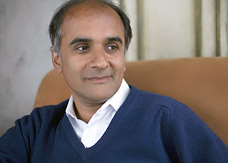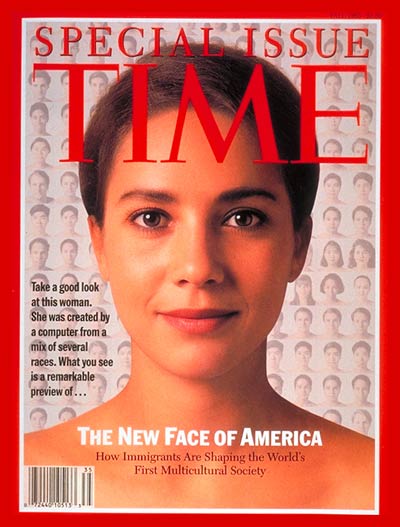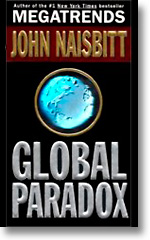
For some, the idea of a world without borders conjures up images of unity and collective purpose. To others, the emerging global village is fraught with complexity and hidden costs. In this collection of essays, interviews, audio clips, and book reviews, handpicked from the many pages that make up this site, I grapple with some of these issues and spotlight the views of some of today's most far-sighted and articulate observers of globalization.
One World: The Promises & Perils of Globalization
Postmodern Tourism — An Interview with Pico Iyer
 In this interview, originally published in The Sun magazine, the eloquent travel writer and cultural critic Pico Iyer reflects on the global village, the increasing cross-fertilization of culture and identity, and the prospect — for better or worse — of a truly universal civilization. "I am a global village on two legs," he says. "More and more people are in this position of having hundreds of different cultures singing and clashing and conspiring within them. I think that the global village is increasingly internalized within us."
In this interview, originally published in The Sun magazine, the eloquent travel writer and cultural critic Pico Iyer reflects on the global village, the increasing cross-fertilization of culture and identity, and the prospect — for better or worse — of a truly universal civilization. "I am a global village on two legs," he says. "More and more people are in this position of having hundreds of different cultures singing and clashing and conspiring within them. I think that the global village is increasingly internalized within us."
Civil Society and the New Global Order
The debate over globalization has focused to a large degree on political and economic forces — on the activities of governments and businesses. What is often overlooked is the role of civil society, the networks of citizens and non-governmental organizations that create a political community, in shaping the new global order. Civil society played a key role in the collape of communism, and it's having an increasingly visible impact on global citizen movements, such as the rise of environmentalism, the push for human rights, and the backlash against economic globalization. This review essay looks at three perspectives on civil society and the interesting ways it's fashioning a new global order.
The Face of Tomorrow: Reflections on Diversity in America
 Throughtout its history, the United States has been a fascinating experiment in cultural fusion, a prototype of the 21st century global village. This essay, which appears in the book Interracial Relationships, looks at the idea of the melting pot and whether it still applies today. "We live in an increasingly diverse and increasingly mongrel society, a nation of blurred boundaries and bizarre extremes. Never before in history has a society been as diverse as the U.S. is today. And never before have so many different traditions, beliefs and values been integrated into a single culture."
Throughtout its history, the United States has been a fascinating experiment in cultural fusion, a prototype of the 21st century global village. This essay, which appears in the book Interracial Relationships, looks at the idea of the melting pot and whether it still applies today. "We live in an increasingly diverse and increasingly mongrel society, a nation of blurred boundaries and bizarre extremes. Never before in history has a society been as diverse as the U.S. is today. And never before have so many different traditions, beliefs and values been integrated into a single culture."
The Perils of Globalization — An Interview with Jerry Mander
In this interview, adapted from the radio series Insight & Outlook, social critic and bestselling author Jerry Mander makes a forceful case against economic globalization, arguing that we need to take a harder look at the hidden costs of deregulation and global free trade. While governments, corporations, and banks make the case that globalization can solve the world's problems, he says, the facts paint a very different picture.
Global Paradox by John Naisbitt
 The major new trends in global economics, politics, and social life all point toward a "global paradox," argues John Naisbitt: "the bigger the world economy, the more powerful its smallest players." As the overall system grows in size and complexity, the importance of the individual parts increases in direct proportion. This apparent contradiction is at work in both business and politics, he says. To survive, big companies today are decentralizing and restructuring. Many have discovered the increased efficiency and effectiveness of lateral rather than vertical organization — networks of autonomous units rather than formal hierarchies. Similarly, as the world economy gets larger, the component nation players become smaller and smaller.
The major new trends in global economics, politics, and social life all point toward a "global paradox," argues John Naisbitt: "the bigger the world economy, the more powerful its smallest players." As the overall system grows in size and complexity, the importance of the individual parts increases in direct proportion. This apparent contradiction is at work in both business and politics, he says. To survive, big companies today are decentralizing and restructuring. Many have discovered the increased efficiency and effectiveness of lateral rather than vertical organization — networks of autonomous units rather than formal hierarchies. Similarly, as the world economy gets larger, the component nation players become smaller and smaller.
The Future of Religion — An Interview with Ninian Smart
In this Q&A, originally published in The Witness magazine, Ninian Smart discusses how the cross-pollination of different religious values and traditions is changing both how and what we believe. Smart was one of the world's foremost scholars of religion and a perceptive observer of how the forces of globalization are reshaping our established systems of belief. One result of all mass migration is the emergence of new forms of religion, he says. "Some Hindus are building temples in Malibu now. They may have been educated in the West and know very little about Hinduism. So they have to invent it from scratch because they want their children to be Hindus. And this is happening not just for Hindus, but for Muslims, Confucians, and so on all over America and Europe. That's a hopeful sign."
World music transcends political, racial, and geographic boundaries in sometimes dramatic ways. The future of the world is the crossing of every kind of culture," says Beninese singer Angelique Kidjo. World music "expresses an open outlook, a lack of musical sectarianism."But even as it bring us closer together, world music also highlights our differences. It's predicated on tradition, on roots, on the things that make us separate and distinct.
In the Footsteps of Gandhi — An Interview with Vandana Shiva
 In a series of hard-hitting books, the noted Indian physicist and environmentalist Vandana Shiva has raised troubling questions about the value of free-market reforms and deregulation. Asshe sees it, the push toward economic globalization has had a host of negative outcomes, from deepening economic disparities and overcrowded cities to ecological destruction and the flattening of local traditions and cultures. In this interview, she discusses the pernicious effects of economic globalization, the rise of "biopiracy," the challenges of overpopulation, and the need to reclaim Mahatma Gandhi's ideas of "satyagraha" and "swadeshi" if we want to realize the true promises of democracy.
In a series of hard-hitting books, the noted Indian physicist and environmentalist Vandana Shiva has raised troubling questions about the value of free-market reforms and deregulation. Asshe sees it, the push toward economic globalization has had a host of negative outcomes, from deepening economic disparities and overcrowded cities to ecological destruction and the flattening of local traditions and cultures. In this interview, she discusses the pernicious effects of economic globalization, the rise of "biopiracy," the challenges of overpopulation, and the need to reclaim Mahatma Gandhi's ideas of "satyagraha" and "swadeshi" if we want to realize the true promises of democracy.
© Copyright 2023 by Scott London. All rights reserved.